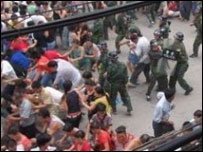
Villagers Confronted Police in Guangdong over Election Fraud
Hundreds of villagers from Shadui Township in the Guangdong city of Xinhui surrounded their township government and had physical confrontation with policemen on Wednesday. Some villager were injured and sent to hospital, Hong Kong Cable Television reported. Villagers said the government did not allow them to vote in the People’s Congress representative election because the government and villagers disputed over use of land. A township official confirmed the conflict but said it was only a “small problem.”
Last week, thousands of residents confronted policemen in front of the city government in Ruian, Zhejiang (see picture). The people claimed that the local government covered up the truth of the suicide of a local teacher and asked for reinvestigation.
http://news.bbc.co.uk/go/pr/fr/-/chinese/simp/hi/newsid_5330000/newsid
_5335500/5335570.stm
http://news.bbc.co.uk/go/pr/fr/-/chinese/simp/hi/newsid_5340000/newsid_5345100/5345162.stm
Happiness Index Derided by the Public
After decades of measuring progress in terms of hard economic data, mainland authorities are set to chart the state of the nation's well-being with the introduction of a happiness index.
National Bureau of Statistics chief Qiu Xiaohua said on Tuesday that the happiness index will include people's feelings towards their living conditions, such as income, employment, social welfare and the natural environment, the South China Morning Post reported.
The new move was ridiculed by many on the Internet. One commentator wrote on the Chinese online chat-room Huashan forum that happiness as an abstract concept and could not be expressed by numbers.
Another wrote that feeling of happiness is only a subjective perception, which does no good to reasonable policy making, but instead, would confuse people and be a waste of social resources to do such surveys. “For example,” the commentator wrote, “a bagger got some hot soup in a freezing day would also feel ‘very, very happy.’ This is the so called ‘happy of poorness.’ ”
There are also comments, though not the majority, supported such measurement, calling it a tool to educate people that happiness does not necessarily associate with material and therefore could curb the trend of consumerism in China, which the commentator deemed as having positive impact.
http://washeng.net/HuaShan/BBS/shishi/gbcurrent/150711.shtml
“Ten Ugly Quotes of Officials” Censured on the Internet
No.1 “Children, don’t move, let the leaders go first.” (An official from local education commission told panic pupils when they were caught in fire in a theater in a Xinjiang city. More than 300 people died, most of them elementary school students in that 1994 catastrophe. )
No.4 “Stop it! I’ve seen too much of this.” (A local government official told a villager who got down on his knees to plea for help from the government in defending his rights.)
No. 5 “China is very safe, no SARS. Welcome to visit China.” (An official from China’ s ministry of public health told foreigners when SARS broke out in 2003.)
No. 8 “I though I’m a pubic official, and all my food, clothing and expense should be provided by the public.” (A corrupted Guangdong official said after being arrested.)
No. 10 “Who asked you to work? You go find them (the employers). The government doesn’t owe you money.” (A government official in Heilongjiang told migrant workers who appealed to the government to help them get their overdue salary.)
The list is widely circulated on the Internet in China, but the original author is not clear. In online chatroom, the list drew hundreds of comments, mostly expressing their anger, discontent and distrust of government officials.
http://www.tianya.cn/new/publicforum/Content.asp?strItem=free&flag=1&idArticle=329239
No comments:
Post a Comment